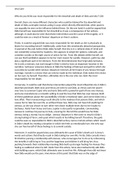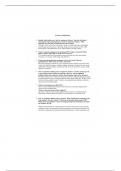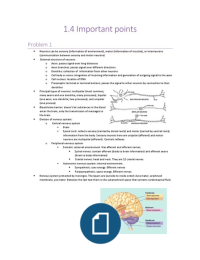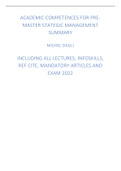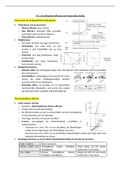BTEC Business Level 3
Unit 1 – Exploring Business – Assignment 2
Assignment Two –
LAC, LAD
Toyota
Unit One – Exploring Business
,NAME
BTEC Business Level 3
Unit 1 – Exploring Business – Assignment 2
Contents Page
Introduction of this assignment
C. P4 Discuss the effect of internal, external and competitive environment on
Toyota
C. P5 Select a variety of techniques to undertake a situational analysis of Toyota
Corporate Social Responsibility
Porter’s Five Forces
C. M3 Assess the effects of the business environment on Toyota
C.D2 Evaluate the extent to which the business environment affects Toyota,
using a variety of situational analysis techniques
D.P6 Explore how the market structure and influences on supply and demand
affect the pricing and output decisions for Toyota
Different market structures
Relationship between demand, supply and price
Pricing and output decisions
D.M4 Assess how a given business has responded to changes in the market
D. D3 Evaluate how changes in the market have impacted on a given business
and how this business may react to future changes.
,NAME
BTEC Business Level 3
Unit 1 – Exploring Business – Assignment 2
INTRODUCTION
In this assignment, I will be discussing, the external environment that effects Toyota through the use of
situational analysis techniques including, political factors, economic factors, the social attitudes that
affect, saving spending, and debt, social responsibility requirements, changes in technology, legal
environment environmental factors, and ethical trends. This assignment will also include, the internal
environment, including, the Corporate Culture, and the Corporate Social Responsibility (CSR), the
competitive environment, including competition, competitive advantage and factors influencing the
competitive advantage. It will also include, factors influencing supply, demand, and the price elasticity of
demand (PED). And finally, the different market structures that Toyota operates in and its impact on
pricing and output decisions and how Toyota responds to them.
C.P4 DISCUSS THE EFFECT OF THE INTERNAL,
EXTERNAL AND COMPETITIVE
ENVIRONMENT OF A GIVEN BUSINESS
1. Internal – SWOT
Strengths:
Toyota's financial strength lies in their position as the most valuable car company in 2021, with a value of
59.47 billion USD, surpassing competitors such as Mercedes-Benz, Volkswagen, and BMW. This not only
demonstrates their strong brand recognition to both loyal and potential customers but also indicates
their financial superiority over competitors by the end of the year. In September 2021, Toyota achieved
the number one ranking for sales with a record share of the new car market.
Another key strength of Toyota is their emphasis on employee welfare, demonstrated by their human
resources department. One of the pillars of the Toyota system is the absence of blame in case of errors,
but rather taking them as a learning opportunity. Additionally, Toyota provides training programs to
improve general abilities and specific job skills for their employees, which are available to all employees
throughout their career with the company. This approach leads to individual problem-solving skills and
strong teamwork, enabling Toyota to ensure higher performance from their employees and approach
their goals and objectives effectively.
Toyota's investment in research and development has led to their advanced technology, allowing them
to create cutting-edge products that are both effective and safe. This technology also provides exposure
and attracts customers to the company.
Overall, Toyota's financial, employee welfare, and technology strengths have enabled them to achieve
success and stand out in the market.
,NAME
BTEC Business Level 3
Unit 1 – Exploring Business – Assignment 2
Weaknesses:
Toyota faces several weaknesses, one of which is the recall of approximately 42,000 vehicles in January
2022, which has significantly damaged their credibility and relationships with clients due to the
mishandling of the acceleration system flaw.
Another weakness is the dismissal of hundreds of jobs, leading to a negative investment environment in
the UK and potential harm to business. Toyota's cash flow has also become a disadvantage, with more
money leaving the business than coming in due to the Covid-19 epidemic. The current cash flow issues
may have a significant negative impact on Toyota's performance once the economy emerges from the
recession.
Moreover, the decline in clients approaching the company to purchase vehicles has prevented Toyota
from selling its manufactured goods and caused a loss, resulting in more cash outflow than inflow. This
lack of planning has also been a disadvantage for the company.
Opportunities:
Toyota has the potential to increase its sales and revenue as the high price of oil due to inflation and
economic disruption creates an opportunity for the company to meet the growing demand for hybrid
cars. Toyota can capitalise on this opportunity by providing more products that satisfy customers’
increasing interest in hybrid and electric vehicles.
The company has the opportunity to receive several grants from the government for specific purposes,
including creating employment opportunities, expanding their business, and possibly relocating. This
support from the government will enable Toyota to grow their business in the UK permanently and
increase their success.
Toyota can also take advantage of the weakness of the Japanese Yen to improve its exports from Japan.
The company's second biggest market after Japan is the US, which presents an opportunity for Toyota to
expand its business there. The rapid growth of developing economies also offers opportunities for the
company to improve its revenues based on these markets. These economic external factors create
opportunities for business growth.
Toyota's significant budget for research and development is its biggest advantage, with a planned spend
of $13 billion this year. This budget allows Toyota to invest in future technologies that will give the
company an edge in clean technology.
Furthermore, Toyota has opportunities to provide more environmentally friendly products, such as
electric cars or cars with higher fuel efficiency. The company can also increase its sustainability
performance through improvements in business process efficiency. The significant
ecological/environmental factors present opportunities that the firm can use for further growth.
Threats:
Toyota is facing competition from Tesla, which is providing tough competition in the post-fossil fuel tech
industry, posing a significant threat to Toyota's market share.
, NAME
BTEC Business Level 3
Unit 1 – Exploring Business – Assignment 2
Another threat that Toyota has experienced is the impact of the COVID-19 pandemic. The economic
crisis has led to a 66% decline in Toyota's sales, severely affecting Japan, USA, and Europe. The pandemic
continues to pose a threat to Toyota's growth until governments administer the vaccine on a large scale.
In a statement, Toyota expects the weakness to impact performance in the foreseeable future.
Rising fuel prices pose a threat to Toyota's sales, especially in markets such as the UK, where prices have
reached an all-time high in the last eight years, and are predicted to continue increasing. A rise in petrol
prices leads to a reduction in the demand for vehicles, which is already happening amidst the pandemic
crisis.
In addition, Toyota must also consider the widening wealth gap, which is a significant threat because it
corresponds to a declining middle class. The middle class is the primary revenue source for Toyota, and
the social external factor of the widening wealth gap is a major concern for the company.
2. External - PESTLE
A PESTLE analysis is a tool that evaluates the key external factors that impact an organisation, including
political, economic, sociological, technological, legal, and environmental factors. This approach can be
utilised in various contexts and is particularly helpful for individuals, professionals, and senior managers
in making strategic decisions. PESTLE analysis aids in the generation of innovative business concepts,
enhances understanding of target audiences, identifies external influences, and more. All of these
factors can potentially impact internal company decisions. The results of a PESTLE study can provide
valuable insights into a company's profitability and help identify business opportunities, risks, and
potential ventures.
Political –
The political landscape encompasses government policies that impact a company's strategic and
operational choices. Such measures can be taken by local, national, or international authorities and can
significantly impact the competitive environment and business efficiency.
For example, the government can negatively affect Toyota's operations by increasing taxes such as
corporate and income tax. Corporate tax is paid based on a company's annual profits and can be levied
by any foreign company with a UK branch or office. Since Toyota operates outside the UK, it only pays
corporation tax on profits from its UK activities. The corporation tax rate in the UK is 19% for all business
profits, but for businesses earning over £50,000 and below £250,000, the rate increases to 25%. This
affects a business's costs and profits, and if the corporation tax rises, Toyota's cost to produce cars and
obtain parts increases, leading to price hikes and potential customer loss. Income tax, on the other hand,
is charged on earned income and can reduce consumer disposable income, affecting Toyota negatively.
Government support and intervention can also benefit Toyota, with grants given for employment
opportunities, business expansion, and relocation. Toyota in Derbyshire is one of over 100 organisations
in England to receive cash from the government, aiding the company's success and business growth in
the UK.
However, Toyota's operations have been negatively affected by the UK's departure from the EU, as the
company faces additional costs and regulations such as tariffs and border control in importing and
exporting parts and cars. This slows down production and causes delays, potentially jeopardising
schedules and forcing the company to change its pricing strategy.
The Russia and Ukraine crisis has also impacted businesses worldwide, causing disruptions and
shortages, with several automotive plants halting production due to supply chain concerns from

